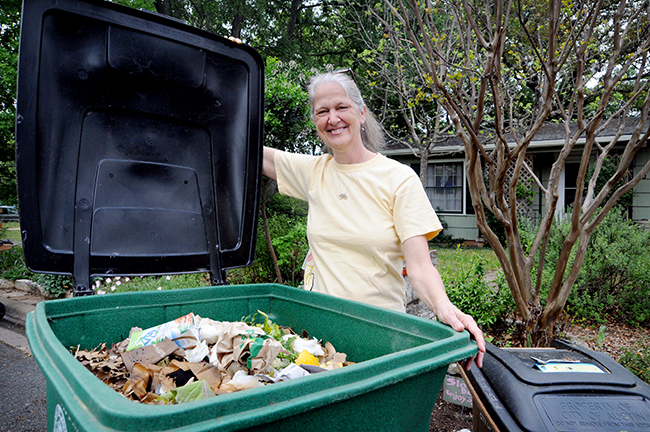What’s a Waste? Curbside Composting Pilot Draws Questions

Austin resident Dawn Leach is a participant of Austin’s curbside organics collection program, a pilot program set to be implemented citywide after one year. Photo by Pu Ying Huang.
By Michelle Chu
For Reporting Texas
Austin’s self-described “tree-huggers and composters” seem hopeful and enthusiastic about a curbside organics collection experiment, and three months into the one-year pilot program, the biggest question is what to do with dog waste and pet hair.
When real estate agent Cynthia Loera, 42, called to get her questions answered, the city confirmed that chicken waste and pet-bed shavings were allowed but that dog poop was not. According to the Austin Resource Recovery website, part of the reason is that the plastic bags often used to pick up pet waste, even if they’re labeled “compostable” or “biodegradable,” break down significantly more slowly than the other materials.
“We were bummed … it stinks up the regular trash and feels wasteful — no pun intended,” said Loera, who lives in Southwood. The middle-class, south-central Austin neighborhood is one of five areas in the pilot program, which asks residents to put food waste, yard trimmings and other compostable material in separate containers from their other trash for curbside pickup.
Engineering associate and 4-year Southwood resident Zoe Trieff, 38, added, “When we found out we couldn’t, there were questions about leaves with dog poop on them.” Loera also mentioned a problem with people who dispose of dog waste in others’ compost bins that are left out on the curbs all week.
According to Austin Resource Recovery Manager Richard McHale, one of the most frequent questions his program receives is, “Can we put pet hair in there?” The answer it gives, after consulting with composting vendor Organics by Gosh, is yes.
The pilot is part of Austin’s zero-waste initiative to reduce the amount of trash sent to landfills by 90 percent by 2040, and participants seem to be experiencing the desired reduction in household trash. Costing the city $485,000, the pilot asked 7,900 households in five areas around Austin to participate. At no additional cost or taxes to the participants, the collected material is transported to Organics by Gosh, a local composting facility, processed and sold.
Austin Resource Recovery Director Bob Gedert will ultimately decide whether to expand the pilot citywide, based on the participation, customer satisfaction, cost and contribution to the zero-waste initiative, McHale said.
Pilot participants do have some complaints. If the waste is compacted, the automated arms on the trash pickup trucks often do not thoroughly dump the carts’ contents, leaving the residual “bottom stuff,” especially tissues and paper towels, said registered nurse and 34-year Southwood resident Helen Rockenbaugh, 58, who numbers herself among the tree-huggers and composters. Loera has even had to call the city to have them re-dump her cart.
Trieff, echoing many neighbors, says the carts are “bigger than they should be.” Many cannot fill the 96-gallon bin within one week, and those who do are left to lug heavy bins to the curbside. The city provides 2.4-gallon kitchen collectors, but they cannot be left on the curbside for pickup.
“My neighbor, a woman in her 80s, wants to compost her kitchen waste but has nothing else to fill her big green bin. So I’ve been putting hers with mine on compost pickup day,” said legal librarian and 15-year Southwood resident Elizabeth Morris, 60.
Once the weather heats up, McHale expects increased complaints about the unpleasant smell and the flies, rodents and other animals it will attract. “We are advising people to keep their carts clean and layer stuff with paper bags. It’s the exact same issue and complaints with trash carts,” he said.
One of Rockenbaugh’s neighbors even suggested freezing the compost until pickup day, “but that would be a mess if you forgot to take it out on time,” she said.
Morris said some neighbors initially felt the pilot was “yet another feel-good program that doesn’t accomplish anything.” But she noticed people responding positively once they understood all the things that could be composted, such as pizza boxes and paper towels. Participants also can save by downsizing their other trash carts and using fewer plastic trash bags. Most households have 64-gallon trash carts, costing $19.75 a month, while 32-gallon and 24-gallon carts cost $14.60 and $13.35 a month respectively.
Located in East Austin, Organics by Gosh has been in the compost and soil mix business for 77 years. Run by the Gosh family, the facility was contracted by the city in September to process the yard trimmings and food waste collected during the pilot.
Because the pilot is a variation of the city’s current program to collect and compost yard trimmings, existing city crews pick up the materials from households, then deliver them to the composting facility. The company does not charge the city anything for processing, but can charge the department if there’s excessive contamination in the city’s waste, said McHale. They then sell the composted product as soil mix.
San Antonio piloted a similar organics recycling program that was deemed “very successful” because less than one percent of residents declined to participate, said Solid Waste Management Department public relations manager Tiffany Edmonds. However, the City Council decided instead to employ a subscription-based program where residents pay $3 monthly for curbside pickup.
San Antonio District 10 City Councilman Carlton Soules told the San Antonio Express-News that providing an extra cart for organics would be too expensive. The city decided to push for more backyard composting instead.